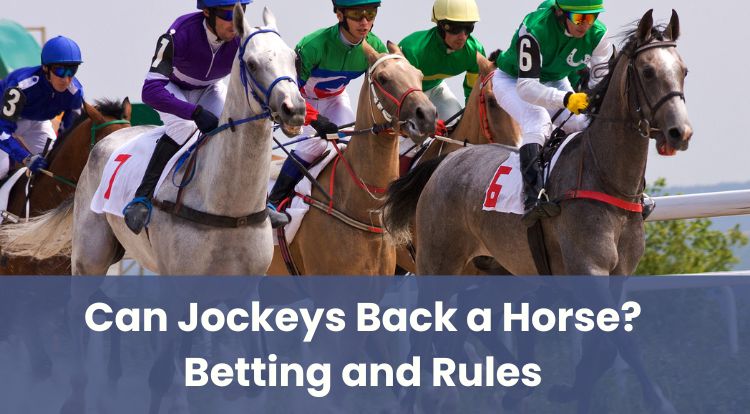
The relationship between jockeys and betting has been a subject of discussion within the horse racing community for some time. People often wonder if jockeys participate in placing bets on races or if there are any regulations governing their involvement.
This article aims to outline the main points related to jockeys and betting, including an overview of the rules Jockeys must follow, as well as the benefits they receive if they win. Read on to learn more.
Betting Laws for All Jockeys
Jockeys in the UK are prohibited from betting on horseracing events. This restriction is part of the British Horseracing Authority’s (BHA) Rules of Racing, which are supported by regulations from the UK Gambling Commission (UKGC). These rules aim to maintain fairness and protect the interests of all involved.
The restrictions apply to jockeys at all levels, including apprentice, amateur, and professional riders licensed by the BHA. This means the guidelines are relevant to anyone authorised to ride in races.
The rules do not allow exceptions. Jockeys must avoid placing bets, sharing tips, or passing on inside information that is not publicly available. Betting indirectly through friends, family, or other third parties is also prohibited. Using such information breaches the Gambling Act 2005 and can lead to disciplinary action.
This framework helps maintain trust in the sport, allowing fans and participants to have confidence in the fairness of each race.
Backing Their Own Horse: The Facts
In addition to the general ban on betting, jockeys are not permitted to place bets on any racehorse, including those they ride. This restriction covers all types of bets, whether placed at a racecourse bookmaker, online, or through third parties.
The BHA’s rules ensure race outcomes remain free from doubts about the rider’s intentions during a race. Preventing jockeys from backing their mounts protects the reputation of horseracing.
Breaching these rules can result in serious consequences, such as suspension or revocation of a jockey’s licence, as well as fines. These measures apply to all riders, whether new or experienced.
How Wages Add Up for Jockeys
Jockeys primarily earn money through riding fees and a share of prize money. These amounts are agreed annually by the Professional Jockeys Association in collaboration with the BHA.
In addition to riding fees, jockeys receive a percentage of the prize money. For flat racing, this is generally about 6.9%, while for jump racing it is close to 8.9%. For instance, if a flat race awards £10,000 to the winner, the jockey would earn roughly £690 from the prize money in addition to their riding fee.
Some jockeys may also earn income from sponsorship or appearance fees, which can vary widely. Jockeys typically pay agents and valets from their earnings. All income is subject to UK income tax and National Insurance contributions.
Do Jockeys Still Get Paid Without a Win?
Jockeys receive a riding fee for every race they take part in, regardless of where they finish. This means that even if their horse finishes last, they are still paid.
In 2024, the riding fee is approximately £164 for each flat race and £223 for each jump race, before deductions such as payments to agents or valets.
Prize money is only awarded to jockeys who finish in certain positions, so if these are not achieved, the riding fee is the only payment received for that race.
Each race offers a separate opportunity to earn, meaning that jockeys with multiple rides in a day may increase their overall income through both participation and results.
**The information provided in this blog is intended for educational purposes and should not be construed as betting advice or a guarantee of success. Always gamble responsibly.
*All values (Bet Levels, Maximum Wins etc.) mentioned in relation to these games are subject to change at any time. Game features mentioned may not be available in some jurisdictions.
